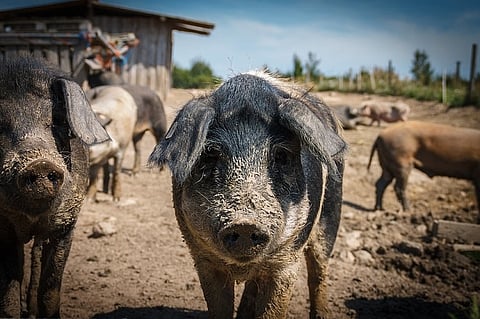

Over the last few years, in addition to Bengaluru's civic issues, a relatively new one has come its way. With over 3,000 pigs trotting about the city streets and rummaging about garbage dumps, it appears the swine menace is here to stay.
When 110 new villages were added to the Bengaluru in 2005, little did the BBMP realise that in addition to the mounting civic issues, they would have to deal with a drove of pigs as well.
"There were several people who rear pigs in these areas. Some of them let the pigs feed out in the open instead of bearing the expense of rearing them and hence the problem," the official explained.
"The pig menace is not prevalent in the core zones but in outer areas like Bommanahalli, Mahadevapura, Dasarahalli, Rajarajeshwari Nagar and off late HSR Layout," an official from BBMP's Animal Husbandry Department said.
The problem initially surfaced in 2011, when the BBMP reported a case of 1,500 pigs near Bommanahalli. To butcher the problem, a tender was floated, offering a lucrative monetary deal, by which the BBMP and the pig catchers would generate income. But the tender process failed, with no takers that year.
Three years later, in 2014, another similar tender was floated. This time 387 pigs were caught in one year.
With thousands of pigs still at large in Bengaluru, the BBMP has decided to revisit the tender this year as well. The municipal corporation has offered to pay the contractor Rs 550 for each pig, out of which the BBMP would get Rs 45. The technical bid determining the experience of applicants and the logistics they possess, will be floated on December 26, while the financial bid will be floated on December 30, the officials from the Animal Husbandry department said.
The plan, however, lucrative it may seem, has been a flop ever since it began and here's why.
The News Minute spoke to an ex-contractor for this scheme, who says that the plan is one that sounds good on paper but the ground realities are different.
"I run a travel business and I got caught in the net as my one of my former employees had floated the tender under my name as he did not have a registered business practice. He could not sustain it for even one week and absconded. So, I got caught as the deal had already been brokered," says Satish Kumar, the former contractor.
Once the job fell into his hands, he had to hire people to catch the pigs.
That was not an easy task either as people are scared of these animals and most of them have a notion that pigs are dirty, Satish confesses. After looking out for over two months he found some catchers in Chikkanayakanahalli.
But the business of catching pigs came with bureaucratic hurdles. The Additional Director of the Animal Husbandry Department, the Health Inspector and the local police have to be notified a day before the pigs are to be caught as these officials must be present whilst catching the pigs.
"In addition, I had to pay Rs 1,400 per person and provide them with food and drinks on the day the pigs were to be caught,” he explains. But Satish observes that his job was made all the more challenging as the catchers would often collude with the owners of the pigs.
“To avoid suspicion, the catchers would inform the owners the date they would come to catch the pigs. The owners would leave behind leave behind five to six pigs for the catchers and take away the rest. Hence, we end up catching lesser pigs than we ought to in a day. At least 12 to 14 people are required to catch five to 10 pigs. And after all that, the owners of the pigs would end up attacking the transport vehicles once the officials leave. The entire process was such a hassle," Satish argues.
Once the hassle of the 'catch' day is over, the streets, which were temporarily ‘de-pigged’, would see the return of the four-legged animals as the owners would put back the ones that would have taken away, he adds.
Another reason why the scheme has no takers, Satish says, is because the contractor has to bear huge losses.
"It is profitable for the catchers but not for the contractor. If 50 to 60 pigs are caught in one go, then we will not have to pay each catcher as much money as we have to every time we set out to catch pigs. Since the catchers make more money if they are called multiple times, they inform the owners beforehand, which leaves us with a meagre number. It is a vicious cycle," he added.
Satish had to bear a loss of Rs 1.7 lakh in just a year and vowed to never take up another contract for catching pigs.
So what can the BBMP do to tackle the problem?
Vinay Moray of Sarvodaya Sevabhavi Samiti, an NGO which runs the Animal Birth Control program in the city, suggested that the civic body set up a pig pound to sterilise them.
"The BBMP should impose a penalty on the owners of these pigs for not taking care of them in hygienic conditions and letting them out on the streets. These pigs are sold in the market and people are consuming it. It is dangerous. By setting up a pig pound, they can be sterilised so as to reduce their population on the streets. This has been suggested to the agency but the plan was turned down," Moray said.